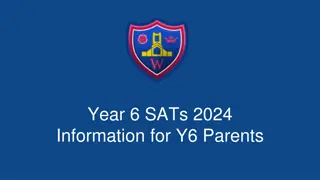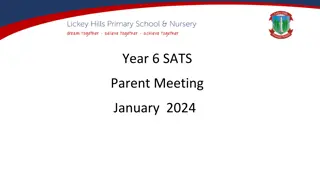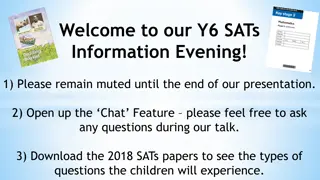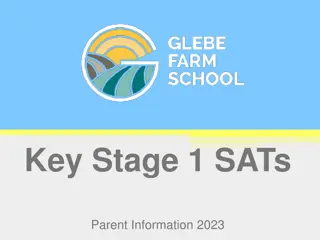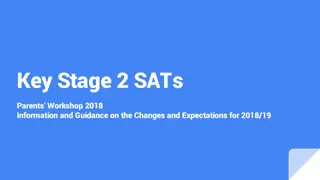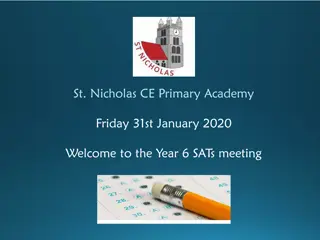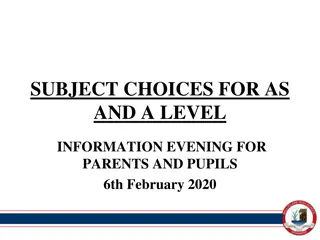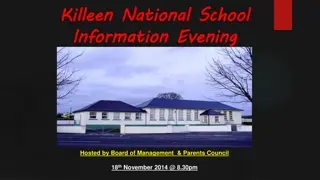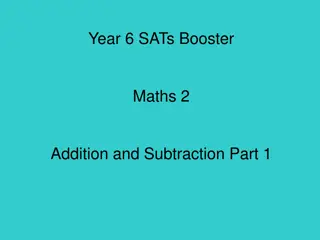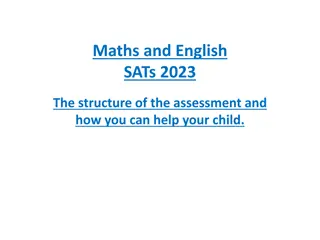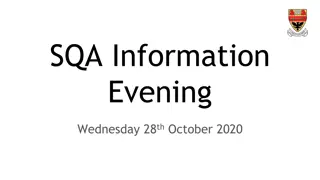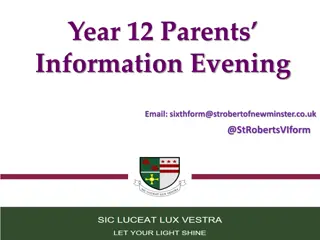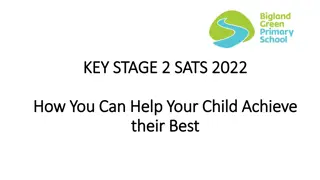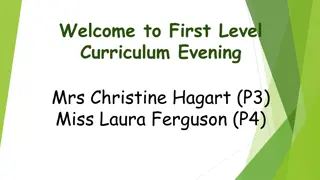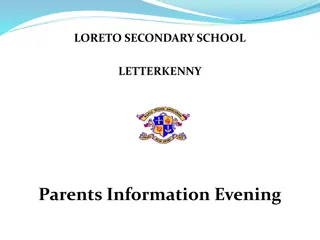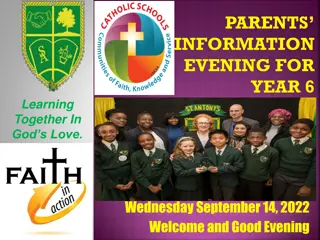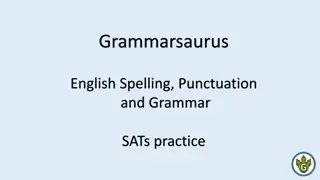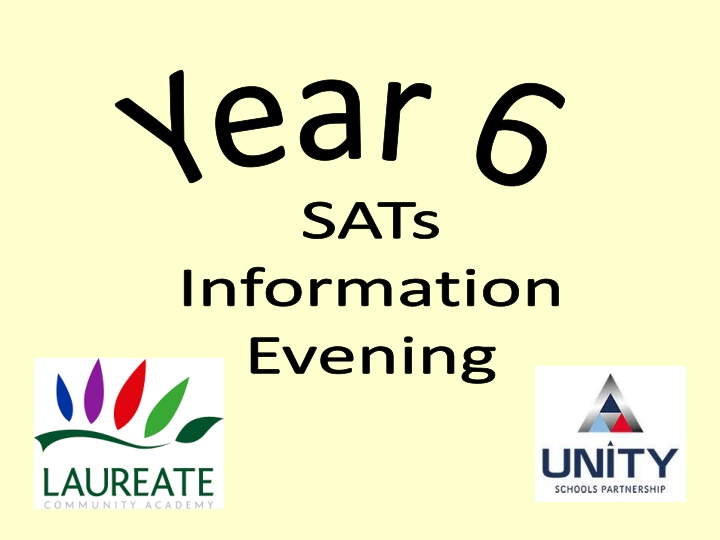
Understanding Year 6 KS2 SATs Information & Expectations
Learn about Year 6 SATs, including important information, session aims, school performance data, attendance impact, assessment expectations, scaled scores, secondary school requirements, and the significance of SATs results for your child's academic journey.
Download Presentation

Please find below an Image/Link to download the presentation.
The content on the website is provided AS IS for your information and personal use only. It may not be sold, licensed, or shared on other websites without obtaining consent from the author. If you encounter any issues during the download, it is possible that the publisher has removed the file from their server.
You are allowed to download the files provided on this website for personal or commercial use, subject to the condition that they are used lawfully. All files are the property of their respective owners.
The content on the website is provided AS IS for your information and personal use only. It may not be sold, licensed, or shared on other websites without obtaining consent from the author.
E N D
Presentation Transcript
Year6 SATs Information Evening Image result for unity schools partnership
Aims of the session To share important information about KS2 SATs To answer any questions about KS2 SATs To share ideas about how you can help your child at home
5 minutes late each day = 25 minutes lost each week = 950 minutes lost each year = 15 hours and 50 minutes lost each year =nearly 4 days learning lost!
What are KS2 SATs? Standard Assessment Tests All children must be tested before they go to secondary school They provide assessment information for secondary schools They assign a raw and scaled score to children before they leave primary school comparing them to other children across the country.
What are the expectations for Year 6 children? A scaled score of below 100 means that a child is working below the expected level for Year 6. To achieve age expectation where the Government expect a Year 6 child to be they should achieve a scaled score of 100. A scaled score of above 100 means that a child is working above the expected level for Year 6 with 110 being a high score (sometimes called Greater Depth or GDS).
Scaled Scores The score in each test is converted to a scaled score 100 here means that you have achieved expected standard. For high score a scaled score of 110 or more is needed.
What information does my childs secondary school want? It varies depending on which secondary school your child is going to! SATs results for reading, maths and SPAG (spelling, punctuation and grammar). Teacher assessments for writing. Information about friendship groups, general behaviour and any concerns. Secondary schools may also administer their own tests on transition days or at the start of term.
Why are SATs results important for your child (and you) at secondary school? Progress 8 is a type of 'value-added' measure that indicates how much a secondary school has helped a pupil improve (or progress) over a five-year period when compared to a government-calculated expected level of improvement. A score of zero means that a pupil has progressed at a rate in line with their results at the end of Key Stage 2. A score above zero means that a pupil has progressed more than their results at the end of Key Stage 2. A score below zero means that a pupil has made less progress than their results at the end of Key Stage 2.
How is SATs week organised? A timetable is issued to school, telling us on which days tests must be administered. All children must sit the tests at the same time. Test papers are opened in front of the pupils; they can only be opened 1 hour before the tests begin for special reasons (e.g. to photocopy onto coloured paper). Tests are completed in classrooms, with any displays that may help covered over. Children are divided into groups for test administration to ensure they are properly supported and feel secure.
Save the Date! Year 6 SATs Week 13th 16th May 2024 Monday 13th May 14th May English Grammar, punctuation 45 mins Spelling test 15-20 mins Tuesday Wednesday 15th May Maths Paper 1 Calculation 30 mins Maths Paper 2 Reasoning 40 mins Thursday 16th May Maths Paper 3 Reasoning 40 mins English Reading Test 60 mins
Mathematics The mathematics SATs consist of: Test 1: Arithmetic test Test 2: Reasoning paper Test 3: Reasoning paper Calculators are not allowed in any of the tests.
Paper 1: Arithmetic 30 minutes - 40 possible marks To assess confidence in using mental and written methods of calculation. If answers are incorrect, 1 mark may be given for using a formal method.
Papers 2 and 3: Reasoning 40 minutes each - 70 possible marks overall To assess mathematical fluency, solving mathematical problems and mathematical reasoning.
Mathematics Some questions are worth one mark and therefore accuracy is important. Other questions are worth two marks and even if the answer is wrong, a mark may be given for correct working towards the answer. Teachers may read questions in Papers 2 and 3 to pupils if asked.
How can parents help with Maths? Support with homework not just helping with the maths but asking your child to read the question and underline important information can really help. TIMES TABLES!!! Help your child to check their work through this will help them to spot mistakes that can sometimes be easily fixed. Communicate in your child s planner any
Reading Test Texts and questions are in order of difficulty. Collection of fictional and non- fictional texts (no common theme).
60 minutes to read the booklet and answer questions.
There are a variety of different questions to be answered in different ways, such as: Literal answer is there in the text. Inference read between the lines. Vocabulary give/explain the meaning of words in context. Organisation layout, use of different fonts. Author sintent e.g. Why does an author use a particular word?
How can parents help with reading ? Ensure your child reads every night / regularly. Encourage your child to read a range of types of materials; fiction and non- fiction. Increase reading speed and duration of reading time. There s a lot to read in the test and it needs to be read quickly. Listen to your child read: - ask them to explain what words mean in the text or help them to look up words they do not understand. - Ask questions about the text what is happening and why; how do characters feel and why? - Show how the more they back up the answer from the text, the more marks will be awarded. (Point, Evidence, Explain - PEE) Help them with the different skills of reading, especially skim reading where they are looking for key words in the text. Increase their ability to check what the question is really asking for.
Grammar, Punctuation and Spelling Test Around 15 minutes 45 minutes to fill in answers
Grammar, Punctuation and Spelling Test Grammatical terms / word classes E.g. nouns, verbs, adjectives, connectives, pronouns, adverbs, prepositions, articles Features of sentences E.g. statements, questions, commands Complex sentences E.g. clauses, phrases, subordinating connectives Standard EnglishE.g. tenses, double negatives, use of I and me Formal/informal language E.g. did not didn t Vocabulary E.g. meanings, synonyms/antonyms, prefixes/suffixes, singular/plural PunctuationE.g. from capital letters, full stops . to brackets, apostrophes, colons
How can parents help with spellings ? Encourage your child to try out a spelling for themselves e.g. Ask does it look right? Show your child spelling patterns, e.g. station, nation . Use the Year 5/6 spelling lists in planners. Talk about unusual spellings in the books you read. Help your child memorise spellings (Look, cover, write, check), apply spellings rules, e.g. tious/cious; tion/cian. Help with words which sound the same but look different e.g. through/ threw, poor/ paw/pour Encourage your child to read regularly.
Writing Writing is internally marked and assessed throughout the year. What makes a good piece of writing?
Writing must have good: Sentence Structure and Punctuation A variety of sentence types. Correct use of a wide range of punctuation. Good connective words and phrases. Text Structure and Organisation A good structure. A beginning, a worthwhile middle and a satisfactory ending. Detailed paragraphs. Composition and Effect An interesting style Well-chosen vocabulary. It should fit the task, i.e. be persuasive, inform or
How can parents help with writing? Read, read, read! The more children read, the more familiar they become with different text types. Provide opportunities for your child to write: journals, postcards, letters, stories, poems, research topics, instructions, posters, plays Encourage use of dictionaries/ thesauruses/ punctuation. Remind your child that expectations of presentation and the basics apply to all written work!
Whats happening in Year 6 to support pupils in their SATS... Regular practice of SAT papers: Maths, Reading Comprehension and SPaG Tests - adapted timetable from January will specifically focus on these areas. Afternoon revision sessions for reading and maths. Before-school booster sessions for reading, arithmetic and maths reasoning. Any gaps are being regularly identified and individuals or small groups are working with staff using PiXL resources to address these. Over-staffing in Year 6 Mrs Fisher, Mrs Beech, Mrs Wright, Mrs Dixon, Mrs Baxter (and other regular volunteers).
Whats happening in Year 6 to support pupils in their SATS... Revision books will be given to pupils for English, Maths and Grammar. Easter Homework Booklet (much better to do little and often rather than in one go). Homework will be set we will alert you when this begins. iPads permission to take home. Should be in school every day and taken home every night. All children have an in-school mentor.
Useful Websites www.primaryhomeworkhelp.co.uk/ http://www.bbc.co.uk/bitesize/ks2/ http://www.funenglishgames.com/grammargames.html https://www.topmarks.co.uk/english-games/7-11-years/spelling- and-grammar https://www.merriam-webster.com/word-games/spell-it http://studyjams.scholastic.com/studyjams/jams/math/index.htm https://ttrockstars.com http://www.amathsdictionaryforkids.com http://www.kidsmathgamesonline.com/
Tips for supporting your child Remember: the children will be working hard at school and will be given revision tasks they will be tired! Show interest in what they are doing. Be positive and give praise. When looking at their work, mention good things first. If you spot errors, only mention one or two. If you want to do extra revision, keep it to short activities. Little and often!
Tips for supporting your child Look for opportunities to build revision into everyday activities. Keep language positive Well done, good try, do your best, much improved etc. Avoid pass/fail, slow, untidy etc. Focus on what your child can do to build their confidence. If you are worried about anything or there is anything that we need to know which may be affecting your child, speak to Mrs Fisher, Mr Perkins, Mrs Dalton or any of the Year 6 team.
Tips for supporting your child during SATs week - or any week! Make sure your child has a good night s sleep the night before each test. Make sure your child has a nutritious breakfast* on the morning of each test and that your child is feeling happy and confident when they leave for school. Make sure your child arrives at school on time and not in a rush. Encourage your child to do their best but reassure them that there is no such thing as a pass or fail. Ask about how they feel they did but avoid searching questions about questions or what they wrote. *School will provide a snack on each day that tests are taking place!
Junior PTA Led by Mrs Beech Raises money for Leavers Hoodies Raises money for Leavers Event Works with the PTA
Any questions?


